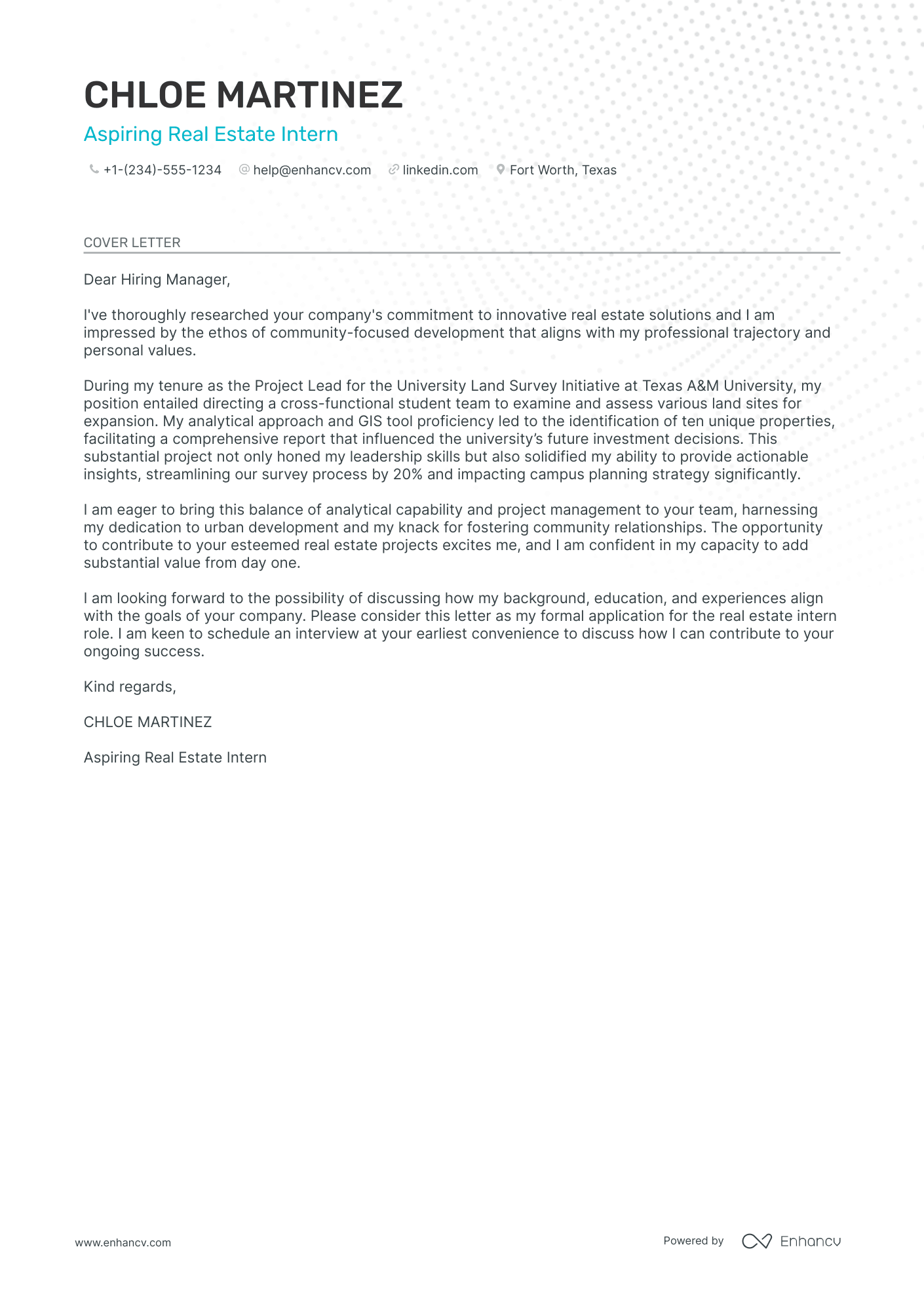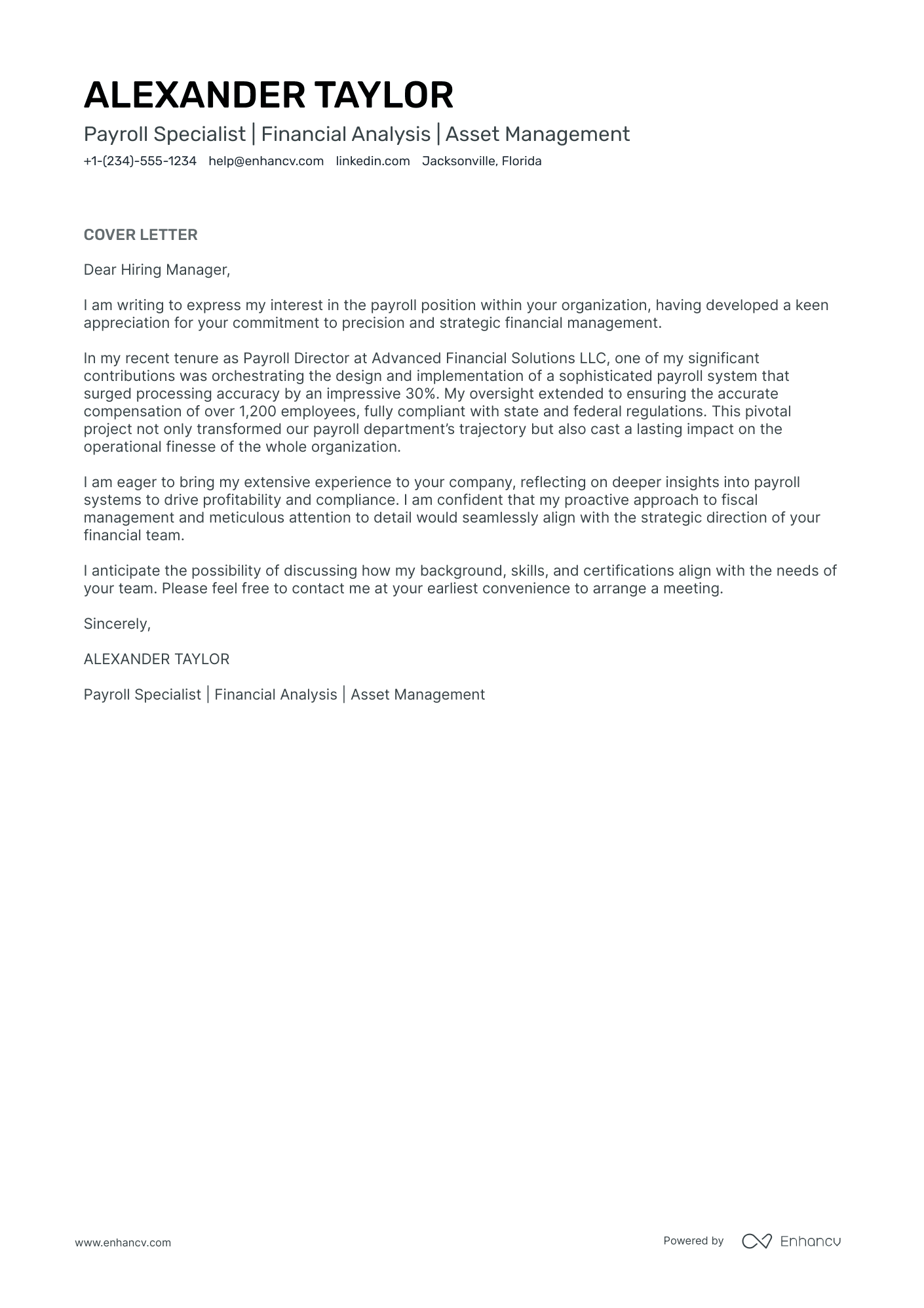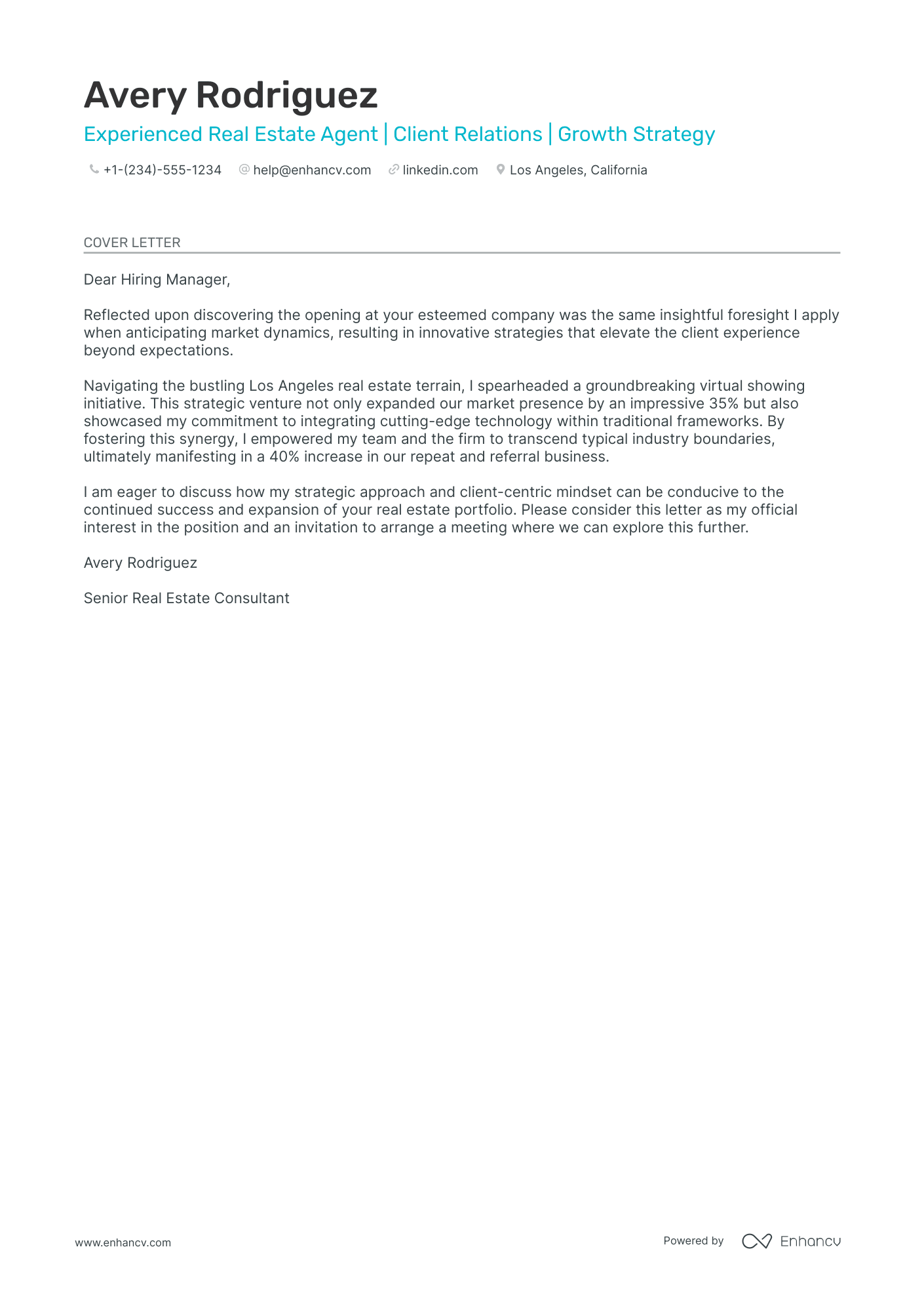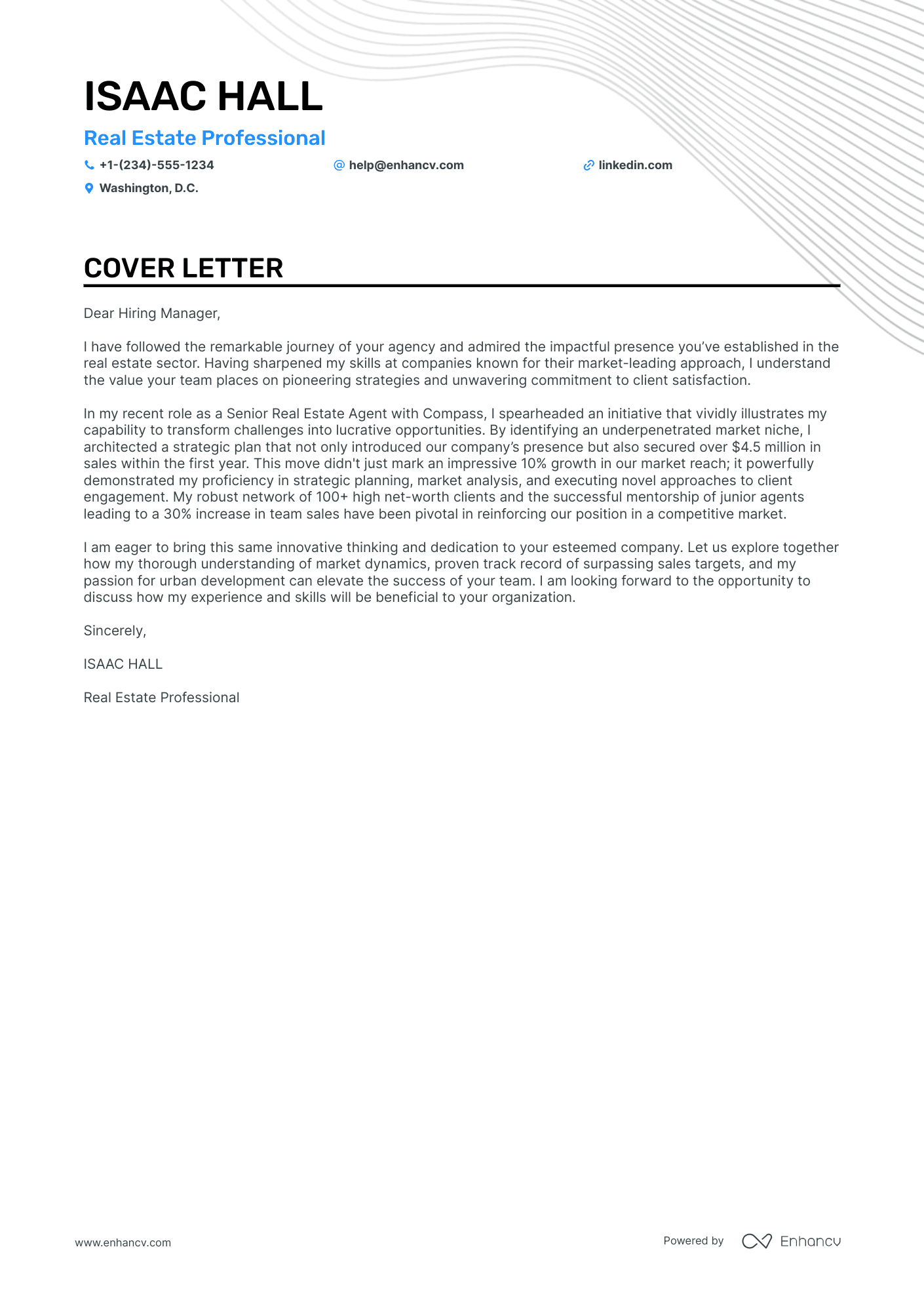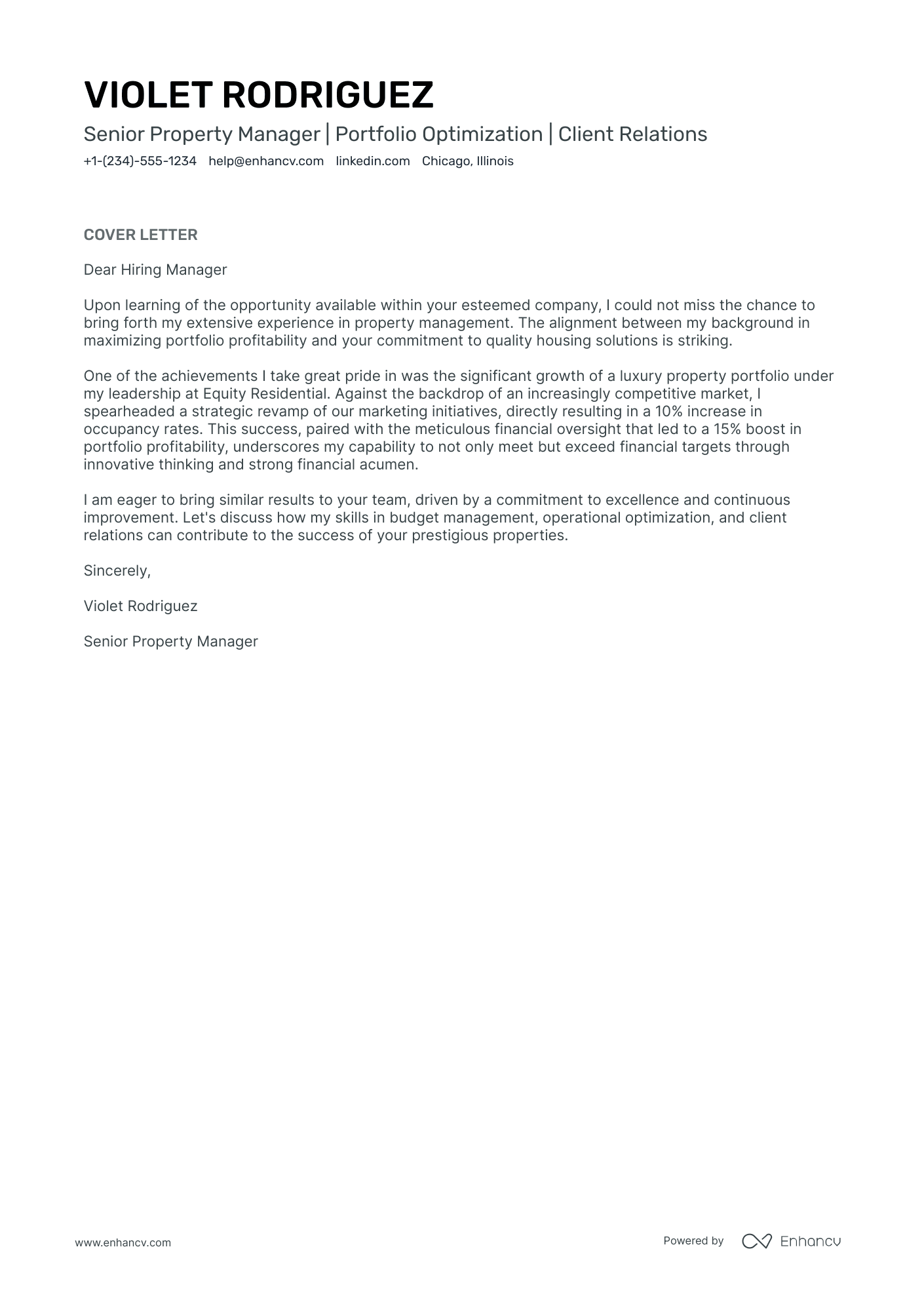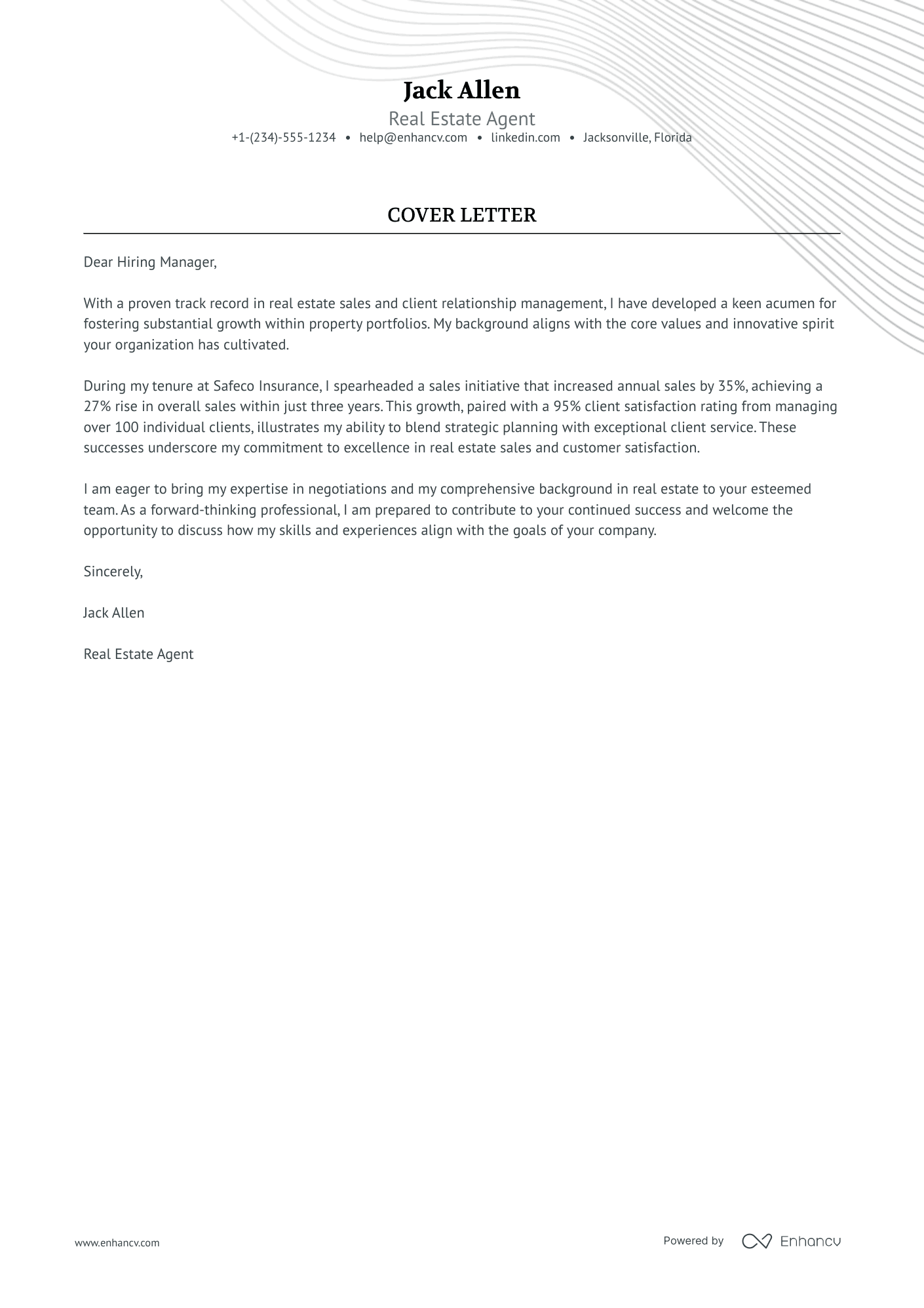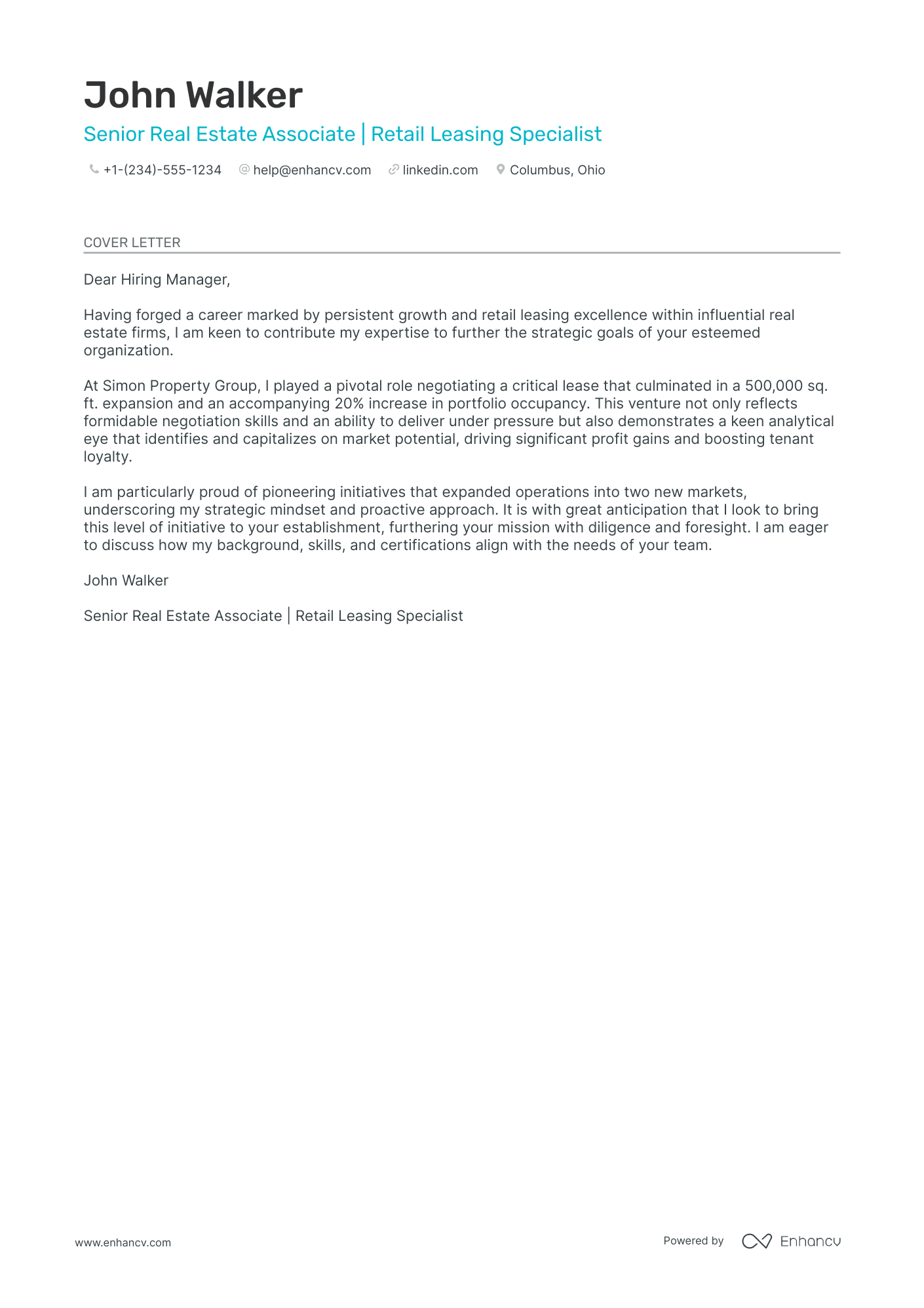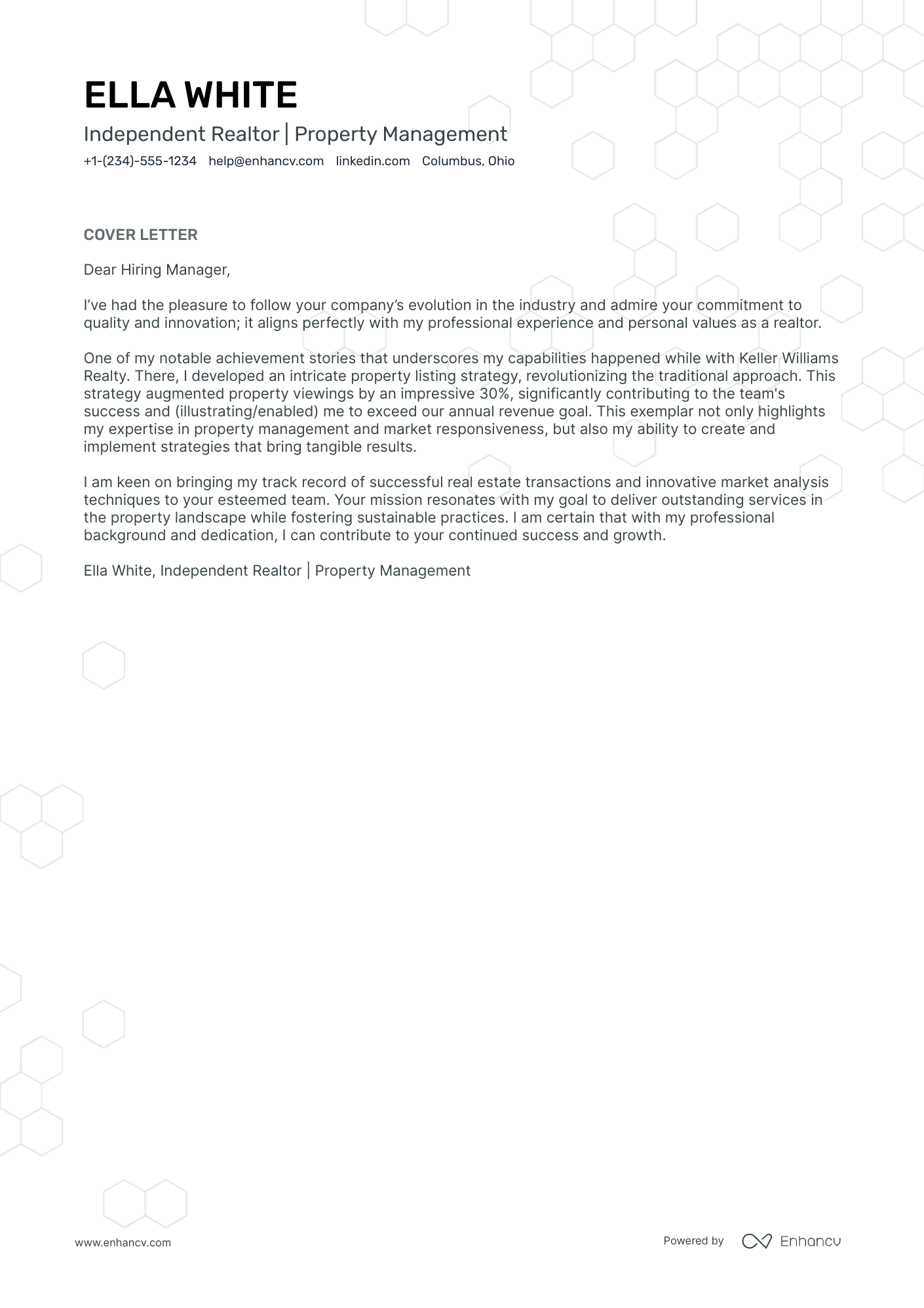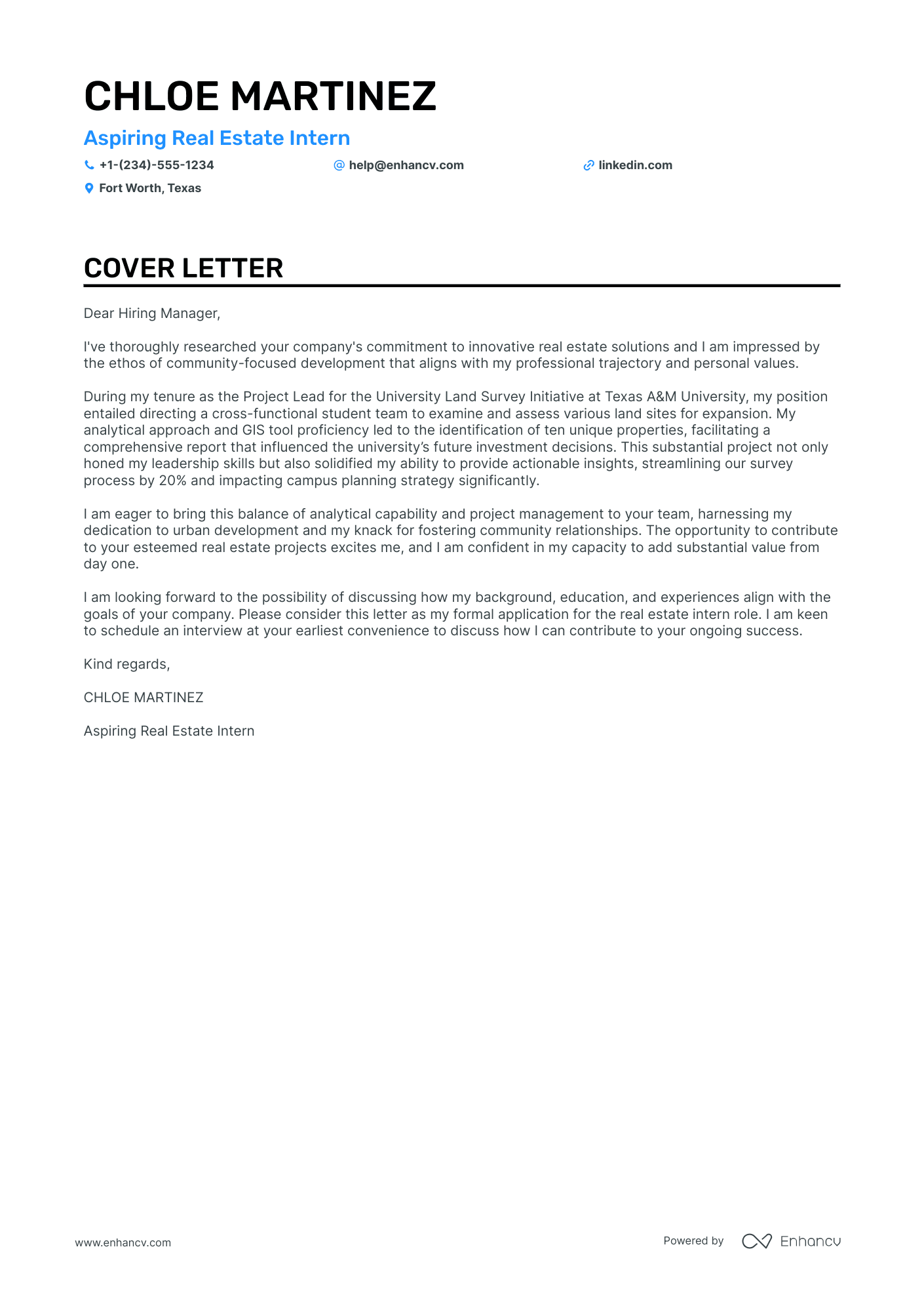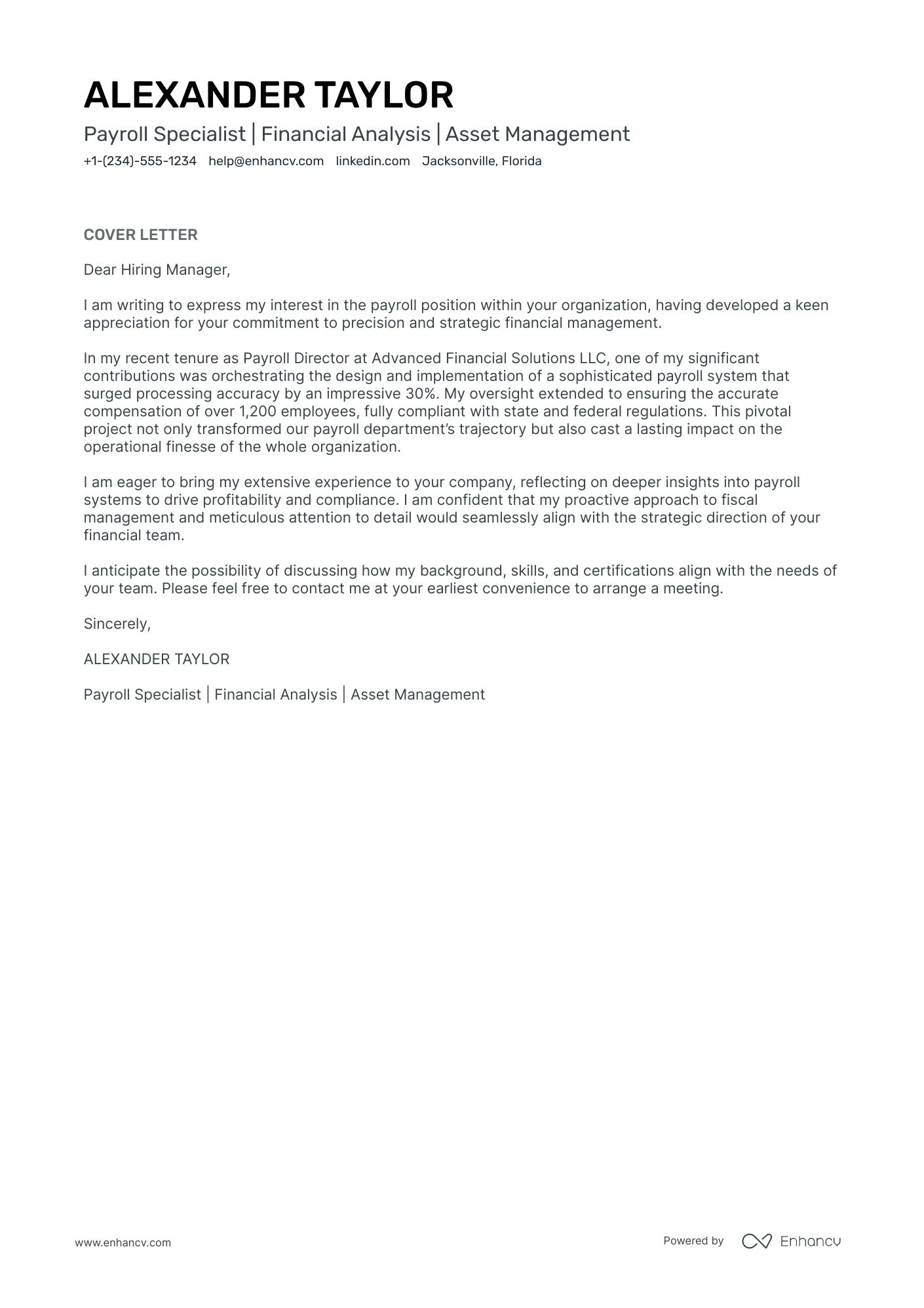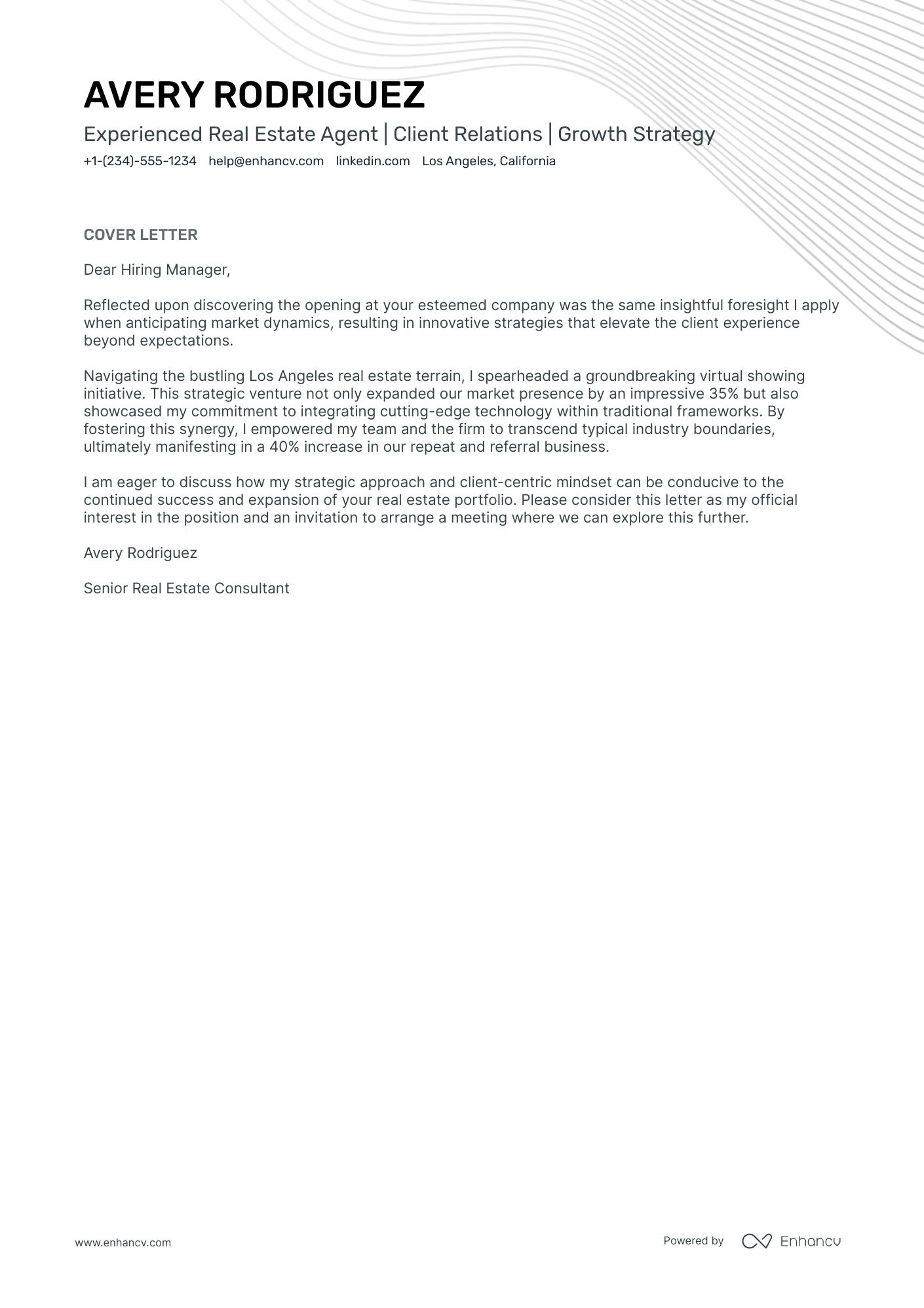Crafting a compelling real estate agent cover letter can often be a stumbling block, even after you've geared up for job applications. It's crucial to thread the needle between formal tone and fresh prose, sharing your proudest career moment without echoing your resume. Brevity is your ally; your cover letter should engage, not exhaust, with a one-page limit. So, let's uncover how to encapsulate your professional story and make every word count toward landing your dream job.
- Some inspiration from other professionals' job-winning cover letters;
- The best structure and format for your real estate agent cover letter;
- Insights on how to write about your best achievement to stand out;
- A creative twist on your real estate agent cover letter intro.
Upload your real estate agent resume to Enhancv's AI, which will quickly scan and prepare a job-winning cover letter for you.
If the real estate agent isn't exactly the one you're looking for we have a plethora of cover letter examples for jobs like this one:
Drop your resume here or choose a file.
PDF & DOCX only. Max 2MB file size.
Real estate agent cover letter example
Leah Torres
Fort Worth, Texas
+1-(234)-555-1234
help@enhancv.com
- Reference to past successes: The letter mentions leading a sales campaign and spearheading a digital marketing initiative, which demonstrates a history of achieving tangible results that are relevant to the prospective employer’s goals.
- Quantifiable achievements: By citing specific figures, such as increasing online leads by 60% and sales by 25%, the candidate showcases their ability to drive growth, an essential skill for a sales-oriented position in real estate.
- Alignment with company objectives: The candidate aligns their experience with the company’s commitment to client satisfaction and innovative practices, making the candidate’s expertise directly relevant to the prospective employer’s needs.
- Offer of innovation: Mentioning the development of an innovative referral program that boosted the client base demonstrates the candidate's initiative and creativity, both important in staying competitive in the real estate industry.
The must-have sections and format of your real estate agent cover letter
When writing your real estate agent cover letter, keep in mind that it'll only be read by the recruiters and not the Applicant Tracker System (or software used to assess your profile). That's why you should structure your content with a/an:
- Header (apart from your contact information, include your name, the role you're applying for, and the date);
- Personalized salutation;
- Opening paragraph to win the recruiters over;
- Middle paragraph with key details;
- Closing that starts from clichés;
- Sign off (that's not mandatory).
Industry standards dictate your paragraphs to be single-spaced and to wrap your content in a one-inch margin. Designing your real estate agent cover letter, refer to one of our templates, which automatically takes care of the spacing and margins.
Choose the same font for your real estate agent cover letter as you did for your resume: the likes of Lato and Bitter would help you to stand out in a sea of cover letters in Arial or Times New Roman.
Export your whole real estate agent cover letter from our builder in PDF to keep the same formatting and image quality.
Maximize your efficiency! With our free cover letter generator, you’ll have a great letter in moments.
The top sections on a real estate agent cover letter
Header: This should include the applicant's name, contact information, and the date, establishing a professional layout and making it easy for the recruiter to reach out.
Greeting: Address the letter to a specific person if possible, which shows attention to detail and a personalized approach, crucial in the real estate industry.
Opening Paragraph: Highlight your enthusiasm for the role and any notable real estate experiences or achievements, signalling immediate value to the recruiting firm.
Body (Industry Experience and Skill Set): Elucidate on relevant real estate experience, sales success, negotiation skills, and local market knowledge, demonstrating your capability to handle the responsibilities of a real estate agent.
Closing Paragraph: Reaffirm your interest in the position, invite further discussion, and thank the recruiter for considering your application, leaving a polite and professional final impression.
Key qualities recruiters search for in a candidate’s cover letter
- Local Market Knowledge: Understanding of local real estate markets, including pricing trends, neighborhood dynamics, and school districts, is crucial for advising clients effectively.
- Strong Negotiation Skills: Ability to negotiate deals that benefit all parties involved, ensuring clients get the best possible terms.
- Excellent Communication and Interpersonal Skills: Being able to convey complex information clearly and build trust with clients, as well as networking with other real estate professionals.
- Sales Experience: A proven track record of successful sales, showing the ability to close deals and generate income.
- Attention to Detail: Managing complex paperwork and transaction details meticulously to ensure legal compliance and safeguard client interests.
- Technological Proficiency: Being adept with real estate software, virtual tour technology, and online listing platforms to effectively market properties and manage client interactions.
What greeting should you use in your real estate agent cover letter salutation
A simple "Hello" or "Hey" just won't work.
With your real estate agent cover letter salutation, you set the tone of the whole communication.
You should thus address the hiring managers by using their first (or last name) in your greeting.
But how do you find out who's recruiting for the role?
The easiest way is to look up the role on LinkedIn or the corporate website.
Alternatively, you could also contact the organization via social media or email, for more information.
Unable to still obtain the recruiter's name?
Don't go down the "To whom it may concern path". Instead, start your cover letter with a "Dear HR team".
List of salutations you can use
- Dear [Hiring Manager's Name],
- Dear [Mr./Ms./Dr.] [Last Name],
- Dear [Hiring Manager's Title],
- Dear [Company Name] Team,
- Dear Hiring Committee,
- Dear [Department Name] Team,
The real estate agent cover letter intro: aligning your interest with the company culture
You only have one chance at making a memorable first impression on recruiters with your real estate agent cover letter.
Structure your introduction to be precise and to include no more than two sentences.
Here are some ideas on how to write a job-winning real estate agent cover letter introduction:
- get creative - show off your personality from the get-go (if this aligns with the company culture);
- focus on your motivation - be specific when you say what gets you excited about this opportunity.
Structuring your real estate agent cover letter body to add more value
You've hinted at your value as a professional (this may be your passion for the job or interest in the company) in your introduction.
Next, it's time to pan out the body or middle of your real estate agent cover letter.
When creating your resume, you've probably gone over the advert a million times to select the most relevant skills.
Well, it's time to repeat this activity. Or just copy and paste your previous list of job-crucial requirements.
Then, select one of your past accomplishments, which is relevant and would impress hiring managers.
Write between three and six paragraphs to focus on the value your professional achievement would bring to your potential, new organization.
Tell a story around your success that ultimately shows off your real value as a professional.
Two ideas on how to end the final paragraph of your real estate agent cover letter
Closing your real estate agent cover letter, you want to leave a memorable impression on recruiters, that you're a responsible professional.
End your cover letter with how you envision your growth, as part of the company. Make realistic promises on what you plan to achieve, potentially, in the next six months to a year.
Before your signature, you could also signal hiring managers that you're available for the next steps. Or, a follow-up call, during which you could further clarify your experience or professional value.
Addressing limited to no experience in the real estate agent cover letter
There's nothing to worry about if you lack professional experience.
Your real estate agent cover letter could bridge the gaps in your professional history by focusing on what matters most to recruiters, that's either:
- skills - focusing on transferable ones you've gained, thanks to your life experience (e.g. volunteering, certificates, etc.);
- achievements - select the most relevant and noteworthy one from your history (e.g. education, projects, etc.);
- motivation - describe how you envision your professional growth in the next up to five years, thanks to this opportunity.
Key takeaways
Turning your real estate agent cover letter into a success is all about staying authentic to yourself and relevant to the job:
- Be creative with your real estate agent cover letter introduction by stating something you enjoy about the company (that is genuine) or about your skill set (to get the recruiters' interested);
- Use single spacing and have a one-inch margin wrapping all around the content of your real estate agent cover letter;
- Select just one past achievement from your career or life to tell a story of how you've obtained job-crucial skills and how they'd be beneficial to the role;
- The finishing paragraph of your real estate agent cover letter doesn't necessarily have to be a signature but could be a promise of what you plan to achieve in the role;
- Instead of focusing on your lack of experience, spotlight your transferable skills, one relevant achievement, and career dreams.
Real Estate Agent cover letter examples
By Experience
Real Estate Intern
By Role
